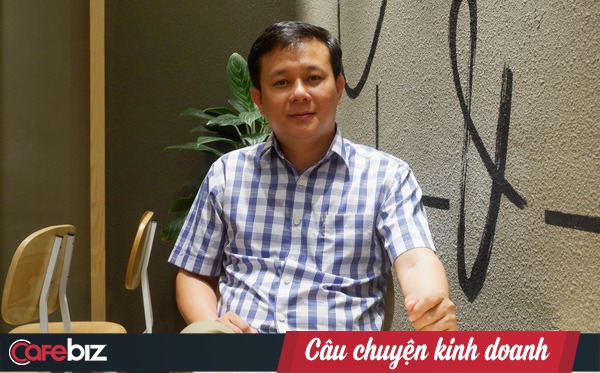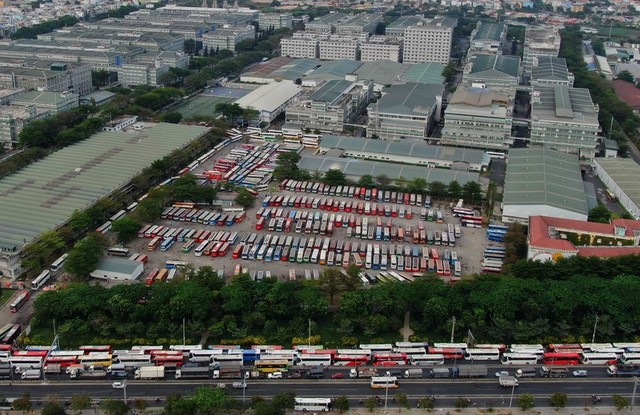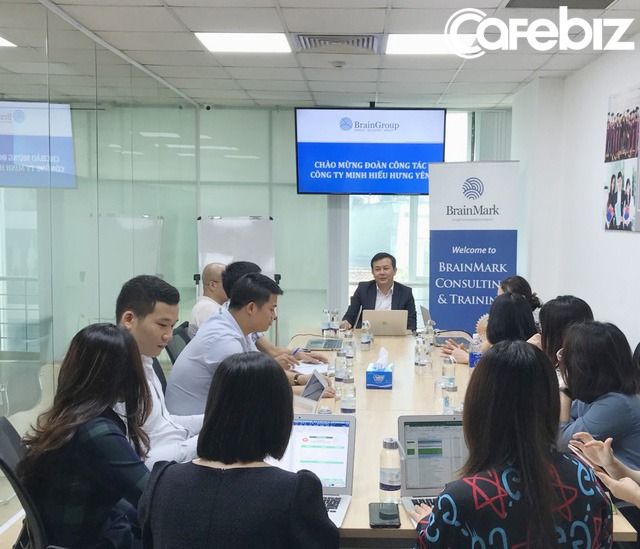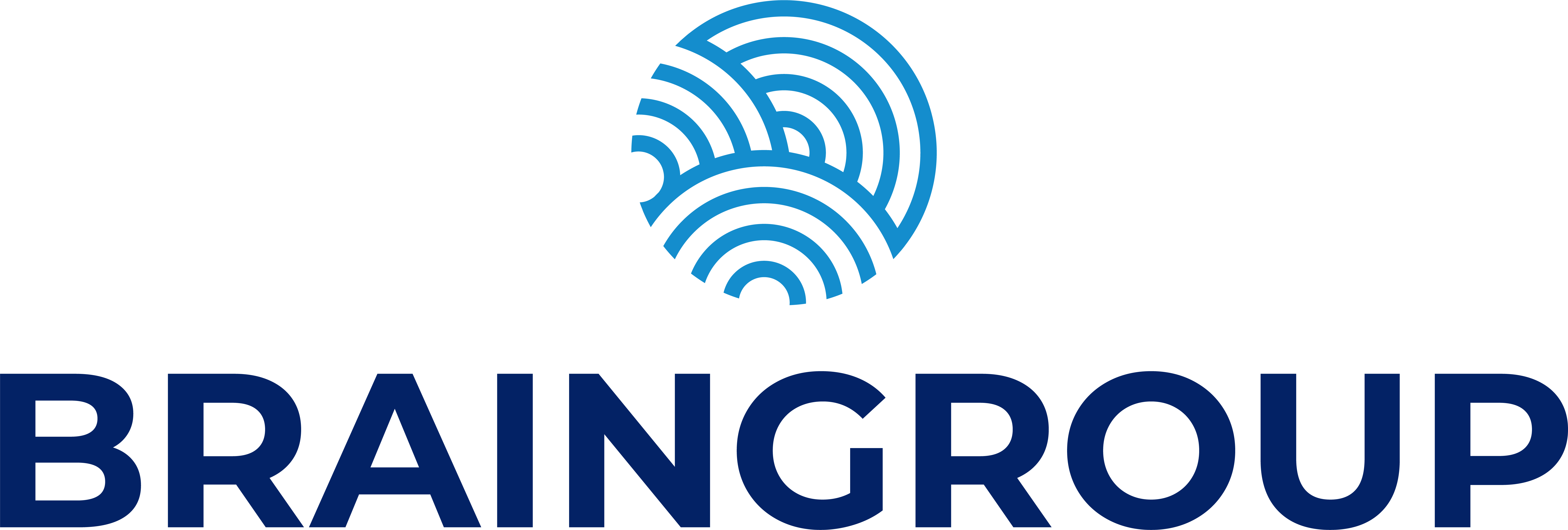With tremendous devastation, Covid-19 has caused countless Vietnamese businesses to be “mortally wounded”, and businesses with 5,000 to 7,000 workers have to close. According to Mr. Nguyen Thanh Tan – BrainMark’s Chief Strategy Officer, only enterprises with a sustainable business model – with a domestic market – with a stable cash flow, can survive and develop.

The economy of Vietnam and the world is going through a very special period, when the Covid-19 pandemic has had unpredictable effects. There is no need for specific statistics, as long as we take a tour of the street, we will see clearly how difficult businesses are, reflected in the beautiful premises previously reserved by brands. rent, now completely abandoned.
BrainMark is a member of BrainGroup, is an enterprise specializing in consulting – training businesses in the field of Management System development, BSC-KPI, Human Resources, Sales, Marketing, Brand … Typical customers of BrainMark : Phu My Hung, Dong Tam, Long Thanh, Lam Son, Quang Ngai Sugar, Unilever, FPT, VNG, Acecook, Ajnomoto, Duy Tan Plastic, Phat Dat, Hau Giang Pharmaceutical …
As a person with more than 20 years working in the business consulting industry, Mr. Nguyen Thanh Tan – Chief Strategy Officer of BrainMark clearly feels those bad movements of the Vietnamese economy. In addition to working at BrainMark, Mr. Tan used to be an independent board member of many companies, including Phat Phat Real Estate Company.
According to this consultant, since the beginning of the year until now, the number of Vietnamese enterprises “leaving” a lot – especially in the export segment. Accordingly, it is possible that corporations or large enterprises will not be completely wiped out like startups or SMEs, but they also atrophy quite a lot. Only a fast-turning business can survive, but if it wants to grow, in addition to rapid rotation, before Covid-19, that enterprise must have a sustainable business model and a good cash flow to meet it.
Can you share a little bit about coping strategies of Vietnamese businesses to survive the Covid-19 pandemic, after the first outbreak and in the second?
Mr. Nguyen Thanh Tan: The first peak wave of the epidemic season came very suddenly and indeed Vietnamese businesses do not know how to respond, because it hits companies that have products for their markets. The school has been hit hard by the pandemic.
For example: during that time, the companies I consulted had markets in Europe, America, and India; Cash flow was almost instantaneous. That is, the business sold out without earning money, the cash flow was zero and forced to close immediately and always, thousands of workers had to leave the factory within the month. That is, I do not even mention the first affected industries such as tourism, aviation.
There are manufacturing companies with large numbers of workers, from 5,000 to 7,000 people, but still close because there is no cash flow. Before Covid-19, they chose export markets, it took time to change to markets that were not influenced by Covid-19. Especially suppliers that specialize in supplying large corporations – one or more customers, but only one market.
There was a certain furniture company that ran in exactly two markets, and these two markets were paralyzed, so they did not have the resources to feed 5,000 to 7,000 workers, forcing them to close.
However, if the enterprise turns faster, has new products to the domestic market or another market, they can maintain a part of the production scale, for example: having 3 factories, closing 2 to 1.
How products of that enterprise, whether it is flexible to meet some other markets or not – is an important lesson after the first climax of Covid-19 in Vietnam.
The second lesson after the end of Covid-19 that most businesses have learned: if an enterprise has an R&D department, ie a strong market and product research department, they can turn it around. That means they went back to producing a part by meeting the domestic market.
In addition, there are companies with a sustainable business model + domestic market + cash flow to save, the company can live and grow. And companies with too much loan or company cash flow depending on the market is too large; then when the market ‘ends’, the company also ends.

PouYuen – ‘giant’ in the world shoe industry laid off several thousand workers during the Covid-19 season. Photo: Nguyen Vu.
Looking at the number and structure of exporters in Vietnam, businesses that satisfy the same conditions as you said do not seem to be many. In addition, for example, how does the company only process each shoe sole and sell it to the domestic market?
Mr. Nguyen Thanh Tan: Yes, quite a few exporters have closed their factories and have not had the chance to come back.
As for companies that only produce 1 part for a product, they must be flexible and invest in a certain line to sell products to domestic brands. However, capturing the domestic market is not easy and it can be done on 1 day 2.
There is a very large shoe export company that specializes in outsourcing to large foreign companies for many years. But the entrepreneur’s biggest dream is to have a domestic shoe brand. Three years ago, this boss tried once, but failed. In 2019, he was determined to do it again, just after finishing it was Covid-19, that project failed again.
That means, if we return to the domestic market, but the market is too new, users have not recognized their brand in time and Covid-19 hits, the stores cannot maintain it, so they must close. Obviously, domestic branding is not easy, even without Covid-19 is a big challenge!
Previously as a supplier, the production was completed and placed on the container for export to foreign countries. Domestic business must be more detailed, must understand consumer insight, branding, distribution, store system, sales management ….
Domestic business, although slightly more extreme than outsourcing for export, but it makes its business model more sustainable. The domestic market is also quite potential with more than 100 million people, large purchasing power.
Through this Covid-19 round, business owners will learn lessons: how to balance the market, not to put eggs in a basket. If our strength is good, we should withdraw part of our resources to invest in the domestic market in some aspect. Because at present, only the domestic market can help Vietnamese businesses survive this Covid-19.
So, in your opinion, how will a business model stand both in clear weather and in stormy times like Covid-19?
Mr. Nguyen Thanh Tan: Business models are very important, each business owner needs to invest in building his own standard model.
The first is to clarify the vision of the business in a peaceful time. Covid was something very sudden and unpredictable, it was a global crisis. If before, I have been able to clarify who my customers are, how to invest, which ones are the main ones, how the main ones grow …; Any business that has such a vision is now quite good.
Because if the main business line breaks, there is still a sub-segment, it is still possible to maintain the business up to 30% – 40%, not die. If we are the owner of a business with 300-400 employees, with sales of about 300 to 400 billion, why not think that we should deduct a portion of resources to create a complete product for the domestic market. location or open chain stores or subcontract some chain stores in Vietnam ?!
This approach makes our model more balanced, if the foreign market does, the domestic market will partly support and vice versa.

Mr. Nguyen Thanh Tan is receiving the delegation of Minh Hieu Hung Yen Company.
After Covid-19, the management mindset of businesses is also different, now I don’t have to make anyone look or run after profit regardless or “get away with it”, but there must be many business plans for businesses. Is it possible to develop sustainably despite the fluctuations of the domestic and foreign market?
Mr. Nguyen Thanh Tan: Exactly, businesses must now create real value. Do not “eat away, stay in”, thinking clearly, which one brings immediate and long-term profits. Flexibility has to start getting higher. Leadership must be flexible, improvised thinking – faster transition. Pandemic happened very quickly, after Da Nang had its first positive case, just about 7 days later, many things started to stop. That’s why I have to switch quickly to live!
The second is flexibility in human resource conversion policies. Where we can take 1 shot, we can let the staff rest immediately. Not to mention business ethics, but how the human resource treatment will affect the income and lives of many employees and their families. From the beginning I had to think about it, if something happened, I had to deal with it – how to switch my staff. That is also a great lesson to learn.
Many people believe that in the pandemic, startups and SMEs have an advantage over large corporations because they have more businesses or flexibility – better transformation. But some argue that the big corporations are the last survivor because they have great resources after years of accumulation. And your opinion like?
Mr. Nguyen Thanh Tan: In general, there are 2 schools of management in Vietnam. The first is the conservative school – typically those who have been too successful in a category in the past, their conservatism is very high. For those who are weak and too conservative in business, focus on only one category, if that industry ‘stuck’, they will ‘stick’ very hard.
Smaller business owners who invest in multiple industries have high flexibility and fast conversion; If this industry dies, they will focus on developing the remaining industries. That is also an advantage!
However, that conclusion holds true only at one point in time – during high market volatility, for example. But in peacetime, if we invest in multiple industries, we may die because of resource scattering. It’s like my vision is out of line, I’m doing this fine, but I see a new opportunity coming and letting go of the old – not completely letting go but reducing investment. After all, I don’t have any strong and weak industries. Any structure that gets this one will lose the other, at a certain time.
Can you share more specifically the effects of Covid-19 on large corporations?
Mr. Nguyen Thanh Tan: Covid-19 comes down from the sky, which can bring a good opportunity for a small group of companies, but is a huge risky problem for corporations.
Corporations in Vietnam are being severely affected. I just received one news, is a group of real estate investment, consumer goods and tourism, seafood; When Covid arrived, the aquatic products died and the tourism stood, forcing the group to contract. They let a lot of employees quit and cut the travel industry – that meant ‘hibernation’ to minimize cash flow, then cut consumer goods – even though their sales of this category were nearly 700 billion dong.
Now, that group has only the real estate segment left to live, because the real estate is sold to the domestic market.
Therefore, even before Covid-19, enterprises must have a vision, assuming that when one market is completely broken, the other market can still live.
Thank you
Source: Quynh Nhu
Cafebiz.vn
Title set by BrainGroup
Link Bài viết: https://cafebiz.vn/chuyen-gia-tu-van-cho-dong-tam-phat-dat-long-thanh-chi-ra-loai-hinh-doanh-nghiep-hiem-hoi-co-the-song-sot-va-tang-truong-trong-mua-covid-19-20200810143806638.chn


 VN
VN